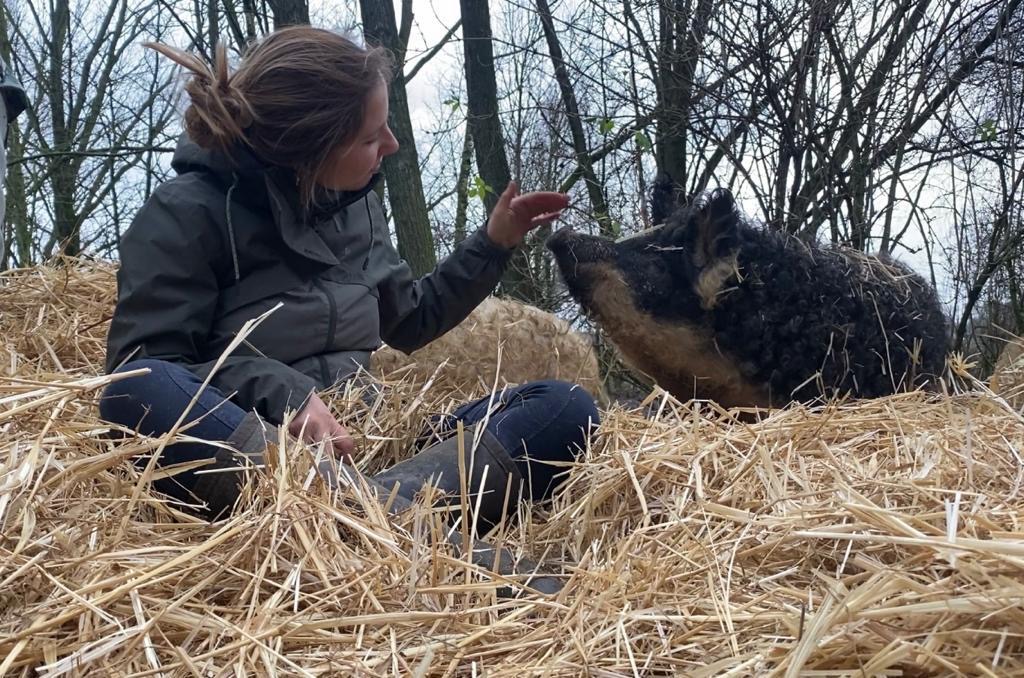Winter is hard for animals and the farmers who care for them
While fields rest under cover crops and the occasional blanket of snow, livestock care becomes more challenging, from ensuring the animals are warm and safe to providing access to adequate food and unfrozen water. Our livestock manager, Astrid, shares her story of winter’s challenges and the hardy animals she cares for year-round.
Astrid
As a breeder and livestock manager, the work I do during the winter is a lot of feeding. There is also a lot of mulching to keep the animals warm. The added bedding helps the animals retain their heat and provides good thermal insulation. The animals have the choice of roaming outside but also of have a warm, mulched refuge point.
During periods of cold and frost, I monitor the water troughs because there is a high risk that they will freeze. I must make sure the animals have water to drink.
The chickens have a mobile henhouse. During the day, they have the choice of roaming outside or coming in to stay warm. The henhouse has an electric trap system that I can adjust the opening and closing times of the trap. That way at night, they are locked up, safe from predators like birds of prey, foxes, everything that threatens their lives. During the winter, I shorten the time they can come out. But in any case, chickens will automatically go to sleep earlier and get up later in winter.
The pigs have insulated sheet metal shelters, with a straw roof covered with a tarpaulin. In winter, I mulch the shelter well, to make sure they don’t get cold. The pigs are a heritage breed, Mangalica pigs, which come from Hungary. They have fur. Our pigs are not forced to stay indoors and be bored. I often catch them in the morning going to swim in their pond, even if it’s 0- or -2-degrees C. Despite the cold, they are still wading, foraging, and developing their natural behavior. These are animals that do not fear the cold at all. They are more sensitive to heat.
The Angus cattle have a straw shelter, covered with a roof and open on the sides. There are three groups that are formed in winter: the breeding group, the heifers, and a fattening group. Angus are hardy enough to withstand the cold of winter, even the little ones who can still be born in winter. The mothers are very maternal, they will protect the little ones who are most sensitive to the cold, and everything generally goes very well.
And finally, there are my two donkeys, who have had their best life. They have shelter that allows them to avoid wading through the mud. They also have access to a limited area of the meadow where they graze on a few blades of grass.
I must ensure the animals’ shelters are sturdy enough to withstand the weather conditions in Belgium. Above all, they must stay healthy and avoid or limit veterinary interventions with medications. Winter requires a lot of preventative care. For examples, some animals receive garlic cures, to prevent respiratory problems when it is too damp or when it is extremely cold.
With preventive care and good nutrition, everything goes well. Chickens receive these preventive treatments year-round because they are more prone to internal parasites and respiratory problems. The Angus continually get salt stones and buckets of trace minerals mixed with garlic. The cattle choose to take this type of nutrient when they feel the need. They are quite resourceful and intelligent animals: they know how to measure their needs. I do not impose that in the ration.
Most of my work during the winter is protecting the animals from the cold and ensuring that they have water. But besides that, I manage the administration and storage. I take the opportunity to do these tasks in winter. Because night falls more quickly, there is less to do in the meadows.
I like winter days when it’s cold but very sunny. Even the animals come out at this time. We all enjoy the sun. The snow and rain undermine the morale of the animals a little, on the other hand. Precipitation and mud are less convenient for working with machines as well.
Winter is a slow time for the animals, even the chickens lay less. No matter what season it is, I must prevent any danger and monitor the animals. As I do a lot of observations, I know the behavior of each animal. I know how to see if the animals are changing their behavior. If he breathes poorly, behaves strangely, you must be vigilant. You must also be vigilant about wildlife. Last year, three wild boars smelled the sows in heat and killed our breeding male. These are many dangers I must guard them against, not just the cold.


